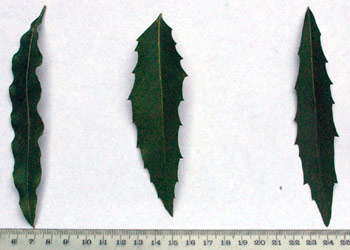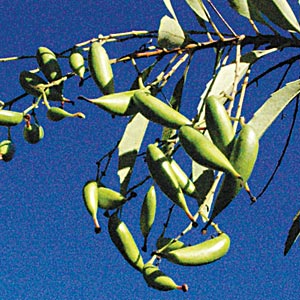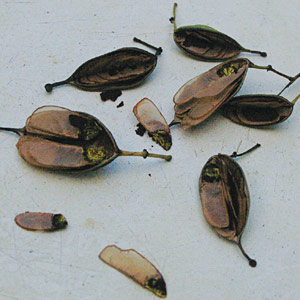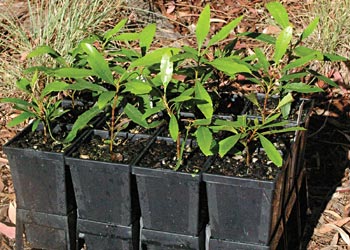
From Pod to Pod - A Tale of Lomatia
John Carter
It all started with a, 'See what you can do with these', as a friend handed me a couple of pods of Lomatia arborescens, the tree lomatia.
In nature, Lomatia arborescens can be found in the McPherson Range of Queensland and north eastern New South Wales, where it grows in rainforest and particularly on exposed mountain tops. It is also found in the gorges of the area.
 |
|
Serrated leaves of Lomatia arborescens
Photo: John Carter |
|
In cultivation, Lomatia arborescens adapts to most soils but grows best in rich loam. It will grow in heavy shade as well as full sun, often growing into a medium large bushy shrub or small tree up to about 7 m tall. Lomatia arborescens can also be used as an indoor plant.
Lomatia arborescens has dark green serrated leaves that complement such shade lovers as Grevillea shiressii (a species rare in nature from the Hawkesbury River) and Lomatia myricoides. Lomatia myricoides occurs in the Canberra area and differs from Lomatia arborescens by having narrower leaves and by growing into a more open and smaller shrub. It too can be propagated from seed and cuttings.
Lomatias are Gondwanan plants being found on the east coast of Australia and in Tasmania, and along the Pacific coast of South America. In South America there are at least three species, L. hirsuta, L. dentata, and L. ferruginea.
The pod I was given contained several winged seeds which germinated readily and I soon had a healthy batch of young plants. True to form, I soon gave them all a haircut for cuttings and potted one up into a 150 mm pot to become a stock plant.
 |
|
 |
Seed pods and winged seed of Lomatia arborescens
Photo: John Carter |
|
I have found semi-hardwood cuttings taken from the stock plant strike fairly readily with the assistance of rooting liquid (IBA and IAA). I take cuttings in winter, placing them in a covered area with bottom heat and alternate day misting.
 |
|
Healthy seedlings of Lomatia arborescens
Photo: John Carter |
|
Plants were first offered for sale in SGAP Canberra sales of 1995. Meanwhile the stock plant in its 150 mm pot decided to break out, extending its roots through the bottom of the pot into the ground below. Because of regular tip pruning for cuttings it has become a medium open shrub (3 m by 3 m, but still going), growing well with its base in permanent shade and moisture, but its crown in full sun.
In 2005 the stock plant, now firmly established in the ground, produced its first flowers, but these were few and did not develop seed pods. In 2008, however, there was extensive flowering followed by a fine crop of pods. These produced seed which was harvested in early April.
The seeds have now been sown to complete the cycle - pod to pod.
References
Elliot and Jones, Encyclopaedia of Australian Plants, Vol. 6
Wrigley and Fagg, Banksias, Waratahs and Grevilleas and all Other Plants in the Australian Proteaceae Family
From the newsletter of the Australian Native Plants Society (Canberra), June 2008.
Australian Plants online - 2008
Association of Societies for Growing Australian Plants
|